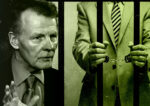Chicago’s top lawyer for property tax appeals wasn’t involved in bribery or corruption but merely did favors for his associates as one of Illinois’ most powerful elected officials, a defense attorney in his federal corruption case argued this week.
Michael Madigan, whose real estate law firm Madigan and Getzendaner ranked first on The Real Deal’s list of the top property tax appeals firms last year, is on trial, accused of racketeering, the Chicago Tribune reported. As Speaker of the Illinois House of Representatives from 1997 to 2021, Madigan allegedly ran his government and political operations like a criminal enterprise. He stands accused alongside his former longtime confidant Michael McClain, a former ComEd lobbyist who is accused of bribing Madigan.
McClain’s attorney, John Mitchell, argued that the bribery case brought against his client and Madigan were an overreach, wrongly criminalizing legal political lobbying.
Prosecutors allege that Madigan used his position to establish a network of corruption, rewarding his allies with lucrative contracts and benefiting utility giants like ComEd and AT&T.
Evidence in the case includes wiretapped phone conversations and undercover recordings, primarily gathered through cooperation deals with insiders like former Alderman Daniel Solis. But the defense insists that there is “no evidence of an exchange that would constitute bribery.”
“You would think if there was an exchange there would be something on there,” Mitchell said, telling the jury that McClain’s actions were within the bounds of the law.
McClain was simply helping Madigan by doing “100 percent legal favors” to maintain their political relationship, the defense maintains.
“There is an old saying that if you walk around all day carrying a hammer you are eventually going to find something that looks like a nail,” Mitchell told jurors. “The government wrongly concluded that Mike Madigan is powerful, and therefore he must be corrupt.”
Testimonies from former state representatives Carol Sente and Scott Drury provided insight into Madigan’s influence over the legislative process. They both described moments when the former speaker exerted pressure on them in private meetings.
Defense attorneys worked to show that Madigan’s behavior was more nuanced, pointing out that not all of his opponents’ bills failed.
Madigan, 82, and McClain, 77, maintain their innocence, with their defenses focusing on the notion that prosecutors have misconstrued routine political operations as criminal activities.
Meanwhile, in the broader legal landscape of Chicago real estate, the property tax appeal industry is experiencing collateral damage from high-profile corruption cases like Ed Burke’s conviction for misusing political influence to benefit his firm, along with Madigan’s ongoing corruption trial.
— Andrew Terrell
Read more



